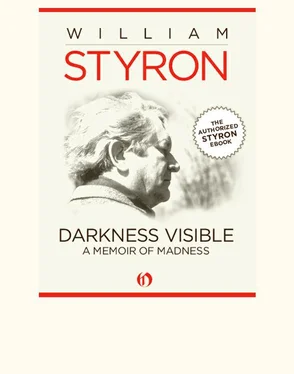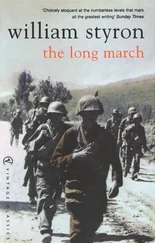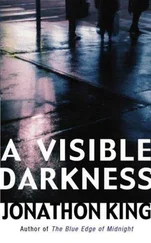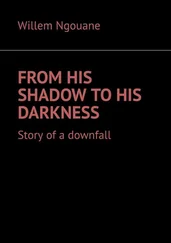William Styron - Darkness Visible
Здесь есть возможность читать онлайн «William Styron - Darkness Visible» весь текст электронной книги совершенно бесплатно (целиком полную версию без сокращений). В некоторых случаях можно слушать аудио, скачать через торрент в формате fb2 и присутствует краткое содержание. Город: New York, Год выпуска: 2010, ISBN: 2010, Издательство: Open Road Integrated Media, Жанр: Биографии и Мемуары, Психология, на английском языке. Описание произведения, (предисловие) а так же отзывы посетителей доступны на портале библиотеки ЛибКат.
- Название:Darkness Visible
- Автор:
- Издательство:Open Road Integrated Media
- Жанр:
- Год:2010
- Город:New York
- ISBN:978-1-936317-29-5
- Рейтинг книги:5 / 5. Голосов: 1
-
Избранное:Добавить в избранное
- Отзывы:
-
Ваша оценка:
- 100
- 1
- 2
- 3
- 4
- 5
Darkness Visible: краткое содержание, описание и аннотация
Предлагаем к чтению аннотацию, описание, краткое содержание или предисловие (зависит от того, что написал сам автор книги «Darkness Visible»). Если вы не нашли необходимую информацию о книге — напишите в комментариях, мы постараемся отыскать её.
Darkness Visible — читать онлайн бесплатно полную книгу (весь текст) целиком
Ниже представлен текст книги, разбитый по страницам. Система сохранения места последней прочитанной страницы, позволяет с удобством читать онлайн бесплатно книгу «Darkness Visible», без необходимости каждый раз заново искать на чём Вы остановились. Поставьте закладку, и сможете в любой момент перейти на страницу, на которой закончили чтение.
Интервал:
Закладка:
VII
IT WAS DR. GOLD, ACTING AS MY ATTENDING PHYSICIAN, who was called in to arrange for my hospital admission. Curiously enough, it was he who told me once or twice during our sessions (and after I had rather hesitantly broached the possibility of hospitalization) that I should try to avoid the hospital at all costs, owing to the stigma I might suffer. Such a comment seemed then, as it does now, extremely misguided; I had thought psychiatry had advanced long beyond the point where stigma was attached to any aspect of mental illness, including the hospital. This refuge, while hardly an enjoyable place, is a facility where patients still may go when pills fail, as they did in my case, and where one’s treatment might be regarded as a prolonged extension, in a different setting, of the therapy that begins in offices such as Dr. Gold’s.
It’s impossible to say, of course, what another doctor’s approach might have been, whether he too might have discouraged the hospital route. Many psychiatrists, who simply do not seem to be able to comprehend the nature and depth of the anguish their patients are undergoing, maintain their stubborn allegiance to pharmaceuticals in the belief that eventually the pills will kick in, the patient will respond, and the somber surroundings of the hospital will be avoided. Dr. Gold was such a type, it seems clear, but in my case he was wrong; I’m convinced I should have been in the hospital weeks before. For, in fact, the hospital was my salvation, and it is something of a paradox that in this austere place with its locked and wired doors and desolate green hallways—ambulances screeching night and day ten floors below—I found the repose, the assuagement of the tempest in my brain, that I was unable to find in my quiet farmhouse.
This is partly the result of sequestration, of safety, of being removed to a world in which the urge to pick up a knife and plunge it into one’s own breast disappears in the newfound knowledge, quickly apparent even to the depressive’s fuzzy brain, that the knife with which he is attempting to cut his dreadful Swiss steak is bendable plastic. But the hospital also offers the mild, oddly gratifying trauma of sudden stabilization—a transfer out of the too familiar surroundings of home, where all is anxiety and discord, into an orderly and benign detention where one’s only duty is to try to get well. For me the real healers were seclusion and time.
VIII
THE HOSPITAL WAS A WAY STATION, A PURGATORY. When I entered the place, my depression appeared so profound that, in the opinion of some of the staff, I was a candidate for ECT, electroconvulsive therapy—shock treatment, as it is better known. In many cases this is an effective remedy—it has undergone improvement and has made a respectable comeback, generally shedding the medieval disrepute into which it was once cast—but it is plainly a drastic procedure one would want to avoid. I avoided it because I began to get well, gradually but steadily. I was amazed to discover that the fantasies of self-destruction all but disappeared within a few days after I checked in, and this again is testimony to the pacifying effect that the hospital can create, its immediate value as a sanctuary where peace can return to the mind.
A final cautionary word, however, should be added concerning Halcion. I’m convinced that this tranquilizer is responsible for at least exaggerating to an intolerable point the suicidal ideas that had possessed me before entering the hospital. The empirical evidence that persuades me of this evolves from a conversation I had with a staff psychiatrist only hours after going into the institution. When he asked me what I was taking for sleep, and the dosage, I told him .75 mg of Halcion; at this his face became somber, and he remarked emphatically that this was three times the normally prescribed hypnotic dose, and an amount especially contraindicated for someone my age. I was switched immediately to Dalmane, another hypnotic which is a somewhat longer-acting cousin, and this proved at least as effective as Halcion in putting me to sleep; but most importantly, I noticed that soon after the switch my suicidal notions dwindled then disappeared.
Much evidence has accumulated recently that indicts Halcion (whose chemical name is triazolam) as a causative factor in producing suicidal obsession and other aberrations of thought in susceptible individuals. Because of such reactions Halcion has been categorically banned in the Netherlands, and it should be at least more carefully monitored here. I don’t recall Dr. Gold once questioning the overly hefty dose which he knew I was taking; he presumably had not read the warning data in the Physicians’ Desk Reference. While my own carelessness was at fault in ingesting such an overdose, I ascribe such carelessness to the bland assurance given me several years before, when I began to take Ativan at the behest of the breezy doctor who told me that I could, without harm, take as many of the pills as I wished. One cringes when thinking about the damage such promiscuous prescribing of these potentially dangerous tranquilizers may be creating in patients everywhere. In my case Halcion, of course, was not an independent villain—I was headed for the abyss—but I believe that without it I might not have been brought so low.
I stayed in the hospital for nearly seven weeks. Not everyone might respond the way I did; depression, one must constantly insist, presents so many variations and has so many subtle facets—depends, in short, so much on the individual’s totality of causation and response—that one person’s panacea might be another’s trap. But certainly the hospital (and, of course, I am speaking of the many good ones) should be shorn of its menacing reputation, should not so often be considered the method of treatment of last resort. The hospital is hardly a vacation spot; the one in which I was lodged (I was privileged to be in one of the nation’s best) possessed every hospital’s stupefying dreariness. If in addition there are assembled on one floor, as on mine, fourteen or fifteen middle-aged males and females in the throes of melancholia of a suicidal complexion, then one can assume a fairly laughterless environment. This was not ameliorated for me by the subairline food or by the peek I had into the outside world: Dynasty and Knots Landing and the CBS Evening News unspooling nightly in the bare recreation room, sometimes making me at least aware that the place where I had found refuge was a kinder, gentler madhouse than the one I’d left. In the hospital I partook of what may be depression’s only grudging favor—its ultimate capitulation. Even those for whom any kind of therapy is a futile exercise can look forward to the eventual passing of the storm. If they survive the storm itself, its fury almost always fades and then disappears. Mysterious in its coming, mysterious in its going, the affliction runs its course, and one finds peace.
As I got better I found distraction of sorts in the hospital’s routine, with its own institutionalized sitcoms. Group Therapy, I am told, has some value; I would never want to derogate any concept shown to be effective for certain individuals. But Group Therapy did nothing for me except make me seethe, possibly because it was supervised by an odiously smug young shrink, with a spade-shaped dark beard (der junge Freud?), who in attempting to get us to cough up the seeds of our misery was alternately condescending and bullying, and occasionally reduced one or two of the women patients, so forlorn in their kimonos and curlers, to what I’m certain he regarded as satisfactory tears. (I thought the rest of the psychiatric staff exemplary in their tact and compassion.) Time hangs heavy in the hospital, and the best I can say for Group Therapy is that it was a way to occupy the hours.
Читать дальшеИнтервал:
Закладка:
Похожие книги на «Darkness Visible»
Представляем Вашему вниманию похожие книги на «Darkness Visible» списком для выбора. Мы отобрали схожую по названию и смыслу литературу в надежде предоставить читателям больше вариантов отыскать новые, интересные, ещё непрочитанные произведения.
Обсуждение, отзывы о книге «Darkness Visible» и просто собственные мнения читателей. Оставьте ваши комментарии, напишите, что Вы думаете о произведении, его смысле или главных героях. Укажите что конкретно понравилось, а что нет, и почему Вы так считаете.












